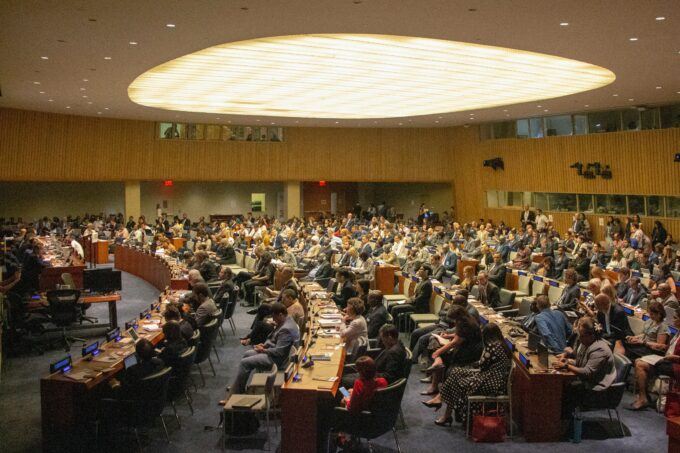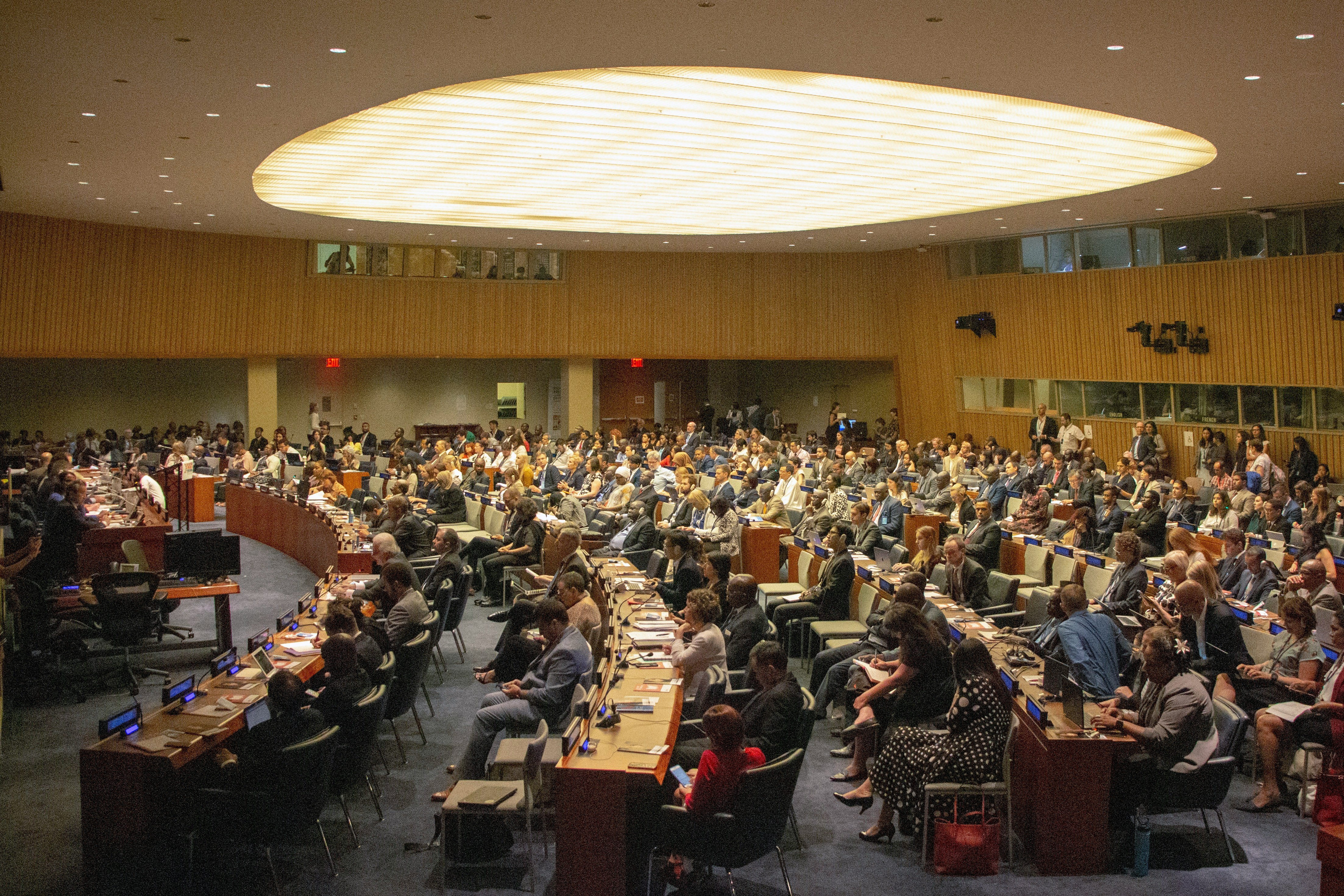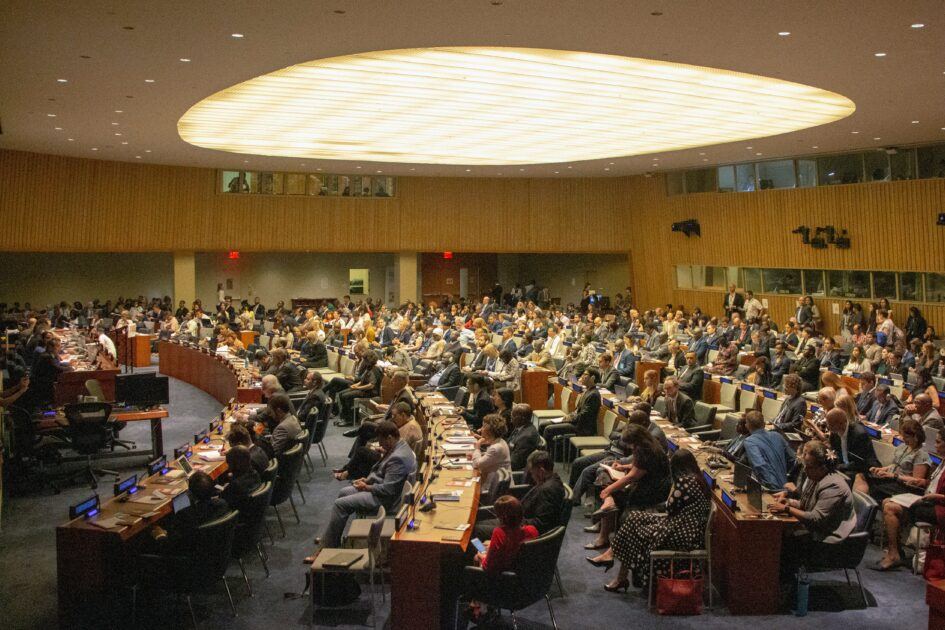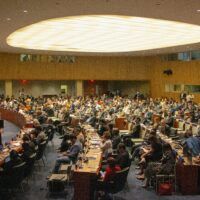


































































“There is no longer a credible way to justify US continuing material and diplomatic support for Israel.” – Photo by Matthew TenBruggencate
Failures of the UN Security Council and Western democracies to maintain international humanitarian law has left Palestinians ensnared in genocide, famine, and forced displacement. Despite the clear grounds for intervention, political will remains absent. In this exclusive interview for CounterPunch, international scholar Richard Falk argues that the General Assembly has the precedent and authority under the Uniting for Peace Resolution to bypass the Security Council and act decisively to protect civilians. Gaza offers a crucial test of whether the international system can prioritize people over politics.
Daniel Falcone: Considering the immobilization of the United Nations Security Council and the disastrous letdowns by Western democracies to maintain (IHL) international humanitarian law, what would it take for General Assembly to authorize a peacekeeping force, such as Blue Helmets, to intervene in Gaza?
Richard Falk: Both the humanitarian and moral imperatives and legal mechanisms are strongly supportive of an armed protective force to ensure the establishment of a permanent Gaza ceasefire, the delivery of food, water, fuel, and medicine to the surviving traumatized and largely malnourished Palestinians that continue to be confined to the killing fields of Gaza. And yet at the same time Gazan Palestinians are being openly threatened with post-genocide forced dispossession from their Gaza homeland or re-occupied as recommended in a variety of plans under consideration without meaningful Palestinian participation. This clashes with the basic human rights commitment to uphold the inalienable right of a nation and its people to self-determination.
The Uniting for Peace Resolution [GA Res. 377(V)] is a flexible instrument empowering the UN General Assembly to act when the Security Council is paralyzed by the right of veto possessed by the five permanent members (P5) in critical situations of global security, war prevention, genocide prevention, and humanitarian emergency. It was initially adopted as a Cold War initiative of the Western UN members to have a means to circumvent Soviet vetoes. UPR was most successfully relied upon in 1956 to secure the withdrawal of French, UK, and Israeli forces from Egyptian territory in a situation where a threat of wider war was addressed by the agreed deployment of a blue helmets UN peacekeeping force. This move supported by the US against its closest European allies and Israel was the high point in the subordination of geopolitical alignments to the core anti-aggression provisions of the UN Charter and has never been repeated. Washington think-tanks and foreign policy advisors have consistently criticized international legal commitments when in tension with alliance relations.
In the aftermath of the Kosovo War of 1999, it became obvious that the global order needed a basis for armed intervention as a last resort if genocide prevention was to become a meaningful component of the international order that emerged after World War II. Previously, in the colonial era, European states often claimed to be engaging in ‘humanitarian interventions’ to disguise their true motivations, which usually involved the exercise of political control and economic exploitation of the country in the Global South so targeted. The Global South was suspicious of such protentional encroachments on their sovereignty and political independence, reacting both to the abuse associated with past claims of humanitarian intervention and objecting to language that seemed to associate what is ‘humanitarian’ with discretion to engage in ‘intervention.’ The UN Charter addresses the issue obliquely in Article 2(7) that prohibits UN intervention in the ‘domestic affairs’ of member states except in instances of UN enforcement operations as authorized by the procedures of Chapter VII of the Charter addressing authorizations of force in the interests of maintaining international peace and security.
The attempted reconciliation of sovereignty with a UN protective role in desperate humanitarian crises became known as “The Responsibility to Protect” or ‘R2P’ with genocide prevention explicitly in mind, adopted in 2005 at a UN Summit as a norm calling for Security Council implementation as circumstances warranted. R2P was discredited by NATO’s 2011 regime-changing intervention in Libya in disguised form being proposed as a humanitarian protective move to protect the allegedly threatened civilian population of Benghazi by Libyan armed forces. Fooled by the humanitarian trappings of the requested UN authorization of force, Russia and China that refrained from using their right of veto no longer trusted the US and its European partners to confine intervention to humanitarian protection.
At this point, given the emergency conditions in Gaza, the General Assembly could extend the Uniting for Peace rationale for self-empowerment in circumstances of UN inaction to the urgency of fashioning a meaningful response to famine and Israeli defiance to comply with international law or the rulings of the ICJ. If this was done immediately it would create a mutually reinforcing legal foundation for UN action including the authorization, funding, and equipping of an armed protective force as the only remaining option given the military escalation involving Gaza City and one million sheltering Palestinians who face slaughter if they refuse evacuation orders that entail facing ultra-hazardous conditions imperiling life and minimal health.
In many respects Gaza presents a unique situation that has confronted the civilian population of Gaza for the past two years since October 7 of at once being entrapped within the lethal combat zones of Gaza with no secure sheltering safe zones, widespread destruction of homes and residential areas, mounting hunger and disease, destruction of habitat both understood as cultural heritage (sacred sites, historic buildings, museums, schools and universities) ecological viability. It would be a final betrayal of law and justice if the perpetrators of the crimes committed by the prolonged and unabashed genocide carried out in Gaza would be allowed to preside over the establishment of Gaza governance, plans for reconstruction, and arrangements for peace, justice, and security.
As of the start of 2025 Israel’s sophisticated manipulation of political discourse has begun rapidly losing the Legitimacy War, even in the complicit countries, on the symbolic battlefields of law and morality, and this is a significant factor in determining political outcomes in major conflicts since World War II. A major exception to Israel’s loss of control over the politics of perception is the maintenance of the largely uncontested identity of Hamas as a hateful terrorist entity that should be permanently excluded from any future formal role in the administration of Gaza. This reductionist view of Hamas is a triumph of Israeli state propaganda as accepted throughout the West as a sign of credibility of mainstream critics, especially when comes to stepping back from all out support of Israel, as illustrated by the German, British, Canadian, and French qualified recognition of Palestinian statehood often accompanied by a ritualized denunciation of Hamas. This neglects the fact that Hamas won an international certified election in 2006 largely on the basis of its resistance to Israeli unlawful occupation and sought a long-term ceasefire with Israel lasting up to 50 years, a proposal explained in detail to me while I was serving as Special Rapporteur for Occupied Palestine by Hamas leaders in Gaza, Doha, and Cairo, and evidently promoted in Washington at the time, but to no avail as Israel was insistent on keeping Hamas on the terrorist list and determined to continue using Gaza as a free zone for the testing of new combat tactics and weapons innovations.
After years of blockading Gaza since 2007 and otherwise abusing the population in defiance of the obligations of international law with respect to belligerent occupation as set forth in the 4th Geneva Convention, a cornerstone of international humanitarian law, the attack of October 7 was instantly characterized as ‘terrorism’ rather than as a hybrid event that acknowledged the Palestinian right of resistance while criticizing verified violations of international humanitarian law in terms of the killing of civilians. Israeli propaganda sensationalized these violation of the law of war through exaggeration and inflammatory, false allegations of barbarism, the refusal to treat their own abusive behavior as a necessary part of the context, and the suspicious failure of the Netanyahu government to heed highly reliable warnings of an impending attack given to Tel Aviv leading to uninvestigated impressions that Israel allowed the attack to happen providing a pretext for launching this massive retaliation.
Such factors give plausibility to the interpretation of Israel’s recourse to genocide as not directly about land and people, and not about security, self-defense, and revenge as is the hasbara claim. Indirectly, it was the largest application of the Dahiya Doctrine by which Israel adopted the doctrine of grossly disproportionate responses to hostile provocations, rationalizing a means to strengthen the deterrence of future provocations. The Dahiya Doctrine was condemned as violating international law in the Goldstone Report prepared under UN auspice after the Israeli military incursion in Gaza at the end of 2008, extending into 2009.
A final relevant consideration is the refutation of all Israeli claims of sovereign rights or occupational authority in Gaza. The Advisory Opinion of the ICJ issued on July 19, 2024 in a near unanimous decision on the applicable law concluded that Israel had so persistently violated its primary duty of an Occupying Power to protect the status quo of an occupied people and ensure its safety and security that it declared that it lost its right to be legally Occupy and was under a legal duty to withdraw from the Gaza and the West Bank within a year and forego any further efforts to control the governance of these Palestinian territories that have so long suffered from Israel’s unlawful policies and practices, culminating in apartheid followed by genocide.
It is against this background that recourse to armed intervention in the form of a UN protective force is the only hope for constructing a serious challenge to Israel’s evident and still active plans to achieve Palestinian erasure as a political presence whether by continuing on the path to extermination or by inducing a Palestinian acquiescence to the Zionist objective of establishing Greater Israel, a one state solution encompassing the whole of mandate or Ottoman Palestine, or more grandiosity of extending the sovereignty from the Nile to the Euphrates, which mean displacing or repressing regional peoples other than the Palestinians, and seriously encroaching upon their territorial sovereignty.
Of course, the formation of a responsible armed protective force remains a daunting practical challenge despite the overwhelming legal, political, and moral case for making it happen. At the very least efforts should be made not to allow Israel to benefit from its crimes by being rewarded in the peace process by shaping the design of future Gaza governance and the Palestinian victimization being further punished by excluding their participation in any future international efforts at peacebuilding in Gaza or the West Bank.
Daniel Falcone: You often stress faith in basic humanity. With the growing global protests and changing views of the public, how can social movements pressure state actors effectively in your view?
Richard Falk: I suspect this may be a misleading impression that may be created by the fact that I have opposed the excessive and abusive use of power by the West in this historical period, but in other settings I would have more faith in the regulatory wisdom of those holding the reins of governmental power than in the wishes and values of people who are susceptible to manipulation and propaganda as the triumphs of ultra-right populism throughout the world currently illustrates, and earlier the rise of European fascism confirms.
The legitimacy of elected governments as in the United States is undermined by the recent rise in influence on the policy process associated by special interests in the private sector but with often controlling influence when it comes to the shaping of government behavior. This is particularly true with respect to the privilege of the wealthy about taxes and inheritance, excessive funding of bloated military and intelligence budgets, and exaggeration of the national interest in relation to alleged security threats associated with remote conflicts and political developments. The US government in the domain of foreign policy, and especially with respect to the use of force overtly or covertly, shows little deference to the opinions of the citizenry, most dramatically illustrated by the unconditional support given Israel despite its defiance of international law and morality, and commitment to policies increasingly treated by public opinion and the mainstream media as ‘genocide.’
The national crisis at the present is a compound of failures: a government subservient to the priorities of special interests rather than the wellbeing of its own citizens or the public good of humanity; a public depoliticized by state propaganda that is not constrained by evidence or truthfulness, and a political opposition that is weak and also subject to similar patterns of responsiveness to special interests and monied pressures. This inadequacy of the Democratic Party as a source of benevolent government is recently and unabashedly illustrated by the refusal of the party leadership to back Zohran Mamdani in the New York City mayoral election, despite his decisive victory in the primaries, and a platform that stresses the wellbeing of people rather than subservience to special interests, including the pro-Israel lobby that has used abundant funds to capture bipartisan unconditional national support for Israel, despite its Gaza campaign and denial of Palestinian rights in their own homeland. Also, unfortunate is the virtual absence of checks and balances to restrain the quixotic and anti-democratic maneuvers of the Trump presidency. There is no longer a functioning independent Supreme Court or Congress. This allows Trump to exert near absolute control over the political process in a manner dangerous for the country and the world, and a blatant repudiation of democracy in a constitutional republic.
Ever since the a-bombs were used in 1945 and the development of nuclear weapons in subsequent years, governments whether democratic or not, were subject to the will of the leader on questions that could eventuate in apocalyptic catastrophe whether by design, miscalculation, or accident. In this vital domain of policy, people and even elected officials are excluded. Decisions are ultimately made by the leader with access to ‘the nuclear football,’ and war plans for use and threat are matters of high secrecy as Daniel Ellsberg documented in his book, The Doomsday Machine, (2017) which disclosed dangerous war plans never disclosed to the public or even to Congress.
Responding to ecological challenges poses analogous issues, especially in the context of climate change, where the avoidance of future catastrophe depends on acting cooperatively in the global public interest. Despite the scientific consensus warning of the dangers of inaction and non-attentiveness, neither government nor the people exhibit the kind of mobilized consciousness needed for an effective global framework dedicated to ecological resilience and guided by allocating responsibility on the basis of perpetrating harm and ability to bear fiscal harm, and strong enough to curtail the efforts of corporations and others to retain the established order without addressing longer term threats.
Daniel Falcone: The UN supported IPC (which leans conservative on methodology) and has declared famine in Gaza. It’s only the fifth such declaration in its history, as cited by the sharp analyst Idrees Ahmad. He cited previous famines in Somalia 2011, South Sudan 2017, 2020, and Sudan 2024. Considering this extreme classification, why do you think international responses remain bland and limited to boilerplate statements of concern rather than constructive paths like no-fly zones or UN peacekeepers?
Richard Falk: The simple answer is because there is not a strong enough political will to act on the part of governments critical of Israel, especially given US continuing support for Israel as evidenced diplomatically by reliance on the veto to block even a mandatory permanent ceasefire decision in the UN Security Council. Those former supporters, including NATO stalwarts UK, France, Canada, and Germany while stepping back, and antagonizing the Israeli government by tendering a recognition of Palestinian statehood, which even if hedged in various ways, was an expression of rising criticism of the latest phases of Israel’s tactics in Gaza, especially related to the blockage of humanitarian aid for a society officially declared to be in the midst of a famine with verified reports of daily deaths due to starvation and malnutrition, particularly affecting young children and the elderly.
While this step back from the Western solidarity with Israel is significant, it is mainly relevant with respect to the symbolic Legitimacy War, which the Palestinian are now winning decisively. We should take notice of the reality that in prior anti-colonial struggles waged since 1945 the side that politically prevailed in these conflicts was not the side that controlled the battlefield but rather the side that seized and held the high moral and legal ground in the conflict. In this sense, the emergence of Israel as ‘a pariah state’ may have more lasting political weight than recognition of Palestinian statehood or even an arms embargo. Thomas Friedman, always a trustworthy weathervane of establishment thinking in the US, has taken notice of this development in a column in the NY Times on August 25 with the provocative title, “Israel’s Gaza Campaign is Making It a Pariah State.” Although typically hedged by including a misleading demonization of Hamas and silence as to Palestinian self-determination rights, it can be viewed as a political surrender by the West in the all-important legitimacy war.
The more complex response to your question concerns the operationalization of an effective response in view of the geopolitical obstacles. What seems called for is an armed protective force supplemented by a no-fly zone over the whole of Gaza with sufficient capabilities to offer safety and security to the surviving Palestinian population. Whether Israel could be induced to consent to such an arrangement is extremely doubtful, and almost certainly the US under Trump would resist, if for no other reason, than opposition to any displacement of geopolitical primacy by deference to such a dramatic UN initiative.
It seems questionable, especially in view of the passive complicity of the leading Arab countries and Organization of Islamic Cooperation (OIC), whether governments would put their citizens at mortal risk by undertaking such a mission even given the famine emergency and the widespread civil society support for such a rescue operation courageously undertaken despite dire risks. Israeli punitive responses to the Freedom Flotilla efforts to deliver humanitarian aid to Gaza are suggestive of the dangers of attempting a forced entry to Gaza under UN auspices. The forthcoming Global Sumud Flotilla sailing from Tunisia, consisting of some 40 ships will further test Israeli resilience.
Daniel Falcone: Ahmad also stated that last year, USAID’s Famine Early Warning System sounded the alarms about the situation in Gaza. Biden forced a retraction and Trump only delivered on subsequent deterioration in this area. This was months before Israel blocked aid and later replaced UN aid distribution points with four GHF sites where Gazans were fired at. How should the public interpret the credibility of governments unwilling to act?
Richard Falk: As earlier responses suggest, it is a matter of mobilizing the political will to bear the costs and uncertain risks of challenging Israel’s behavior in the Occupied Palestinian Territories, however much it was itself acting unlawfully and now lacks any authority to perform as the legitimate occupying power. The US conduct dating back to the Biden presidency suggests a US unconditional commitment to Israel’s Gaza campaign. It is a matter of geopolitics taking clear, if disguised, dominance of the policy process, and a consequent disregard of the inhibitions of law, morality, and public opinion.
Now that the famine conditions are evident and combined with Israel’s defiant escalating violence directed at a starving, malnourished, and traumatized Palestinian survivors in Gaza, reinforced by the killing of truth-telling journalists and attacks directed at medical workers and facilities, there is no longer a credible way to justify US continuing material and diplomatic support for Israel. The Trump presidency is virtually silent as far as offering Israel sentiments of solidarity but continues to be active as by the recent sanctioning of the brave truth-telling UN special rapporteur on Occupied Palestine and officials of the International Criminal Court for acting against Israel.
Daniel Falcone: What are your thoughts on R2P and the ability to exercise it now? Is it time for the issuing of a no-fly zone and armed intervention at the IGO level?
Richard Falk: R2P was conceived in the aftermath of the Kosovo War in 1999, as an internationalized alternative to colonial era ‘humanitarian intervention’ by which the Global West used humanitarian arguments to disguise imperially motivated interventions, which usually were designed to protect ideological and economic goals. R2P was supposed to be a post-colonial expression of global responsibility for genocide prevention and other severe situations of danger arising from state repression or crimes against ethnic minorities. R2P was invoked in 2011 by NATO members of the Security Council in response to alleged dangers faced by the civilian population of Benghazi threatened by attacks from advancing military forces of the Qaddafi government in Libya.
Skeptical members of the Security Council, including Russia and China, were persuaded to abstain rather than veto the reliance on R2P to authorize a no-fly-zone and a protective armed force by reassurance that the goals would be confined to the humanitarian mission. R2P was discredited by NATO forces immediately engaging in a regime-changing military operation that resulted in producing chaos in Libya and the extra-legal execution of Qaddafi by a street mob. As a result, it was not relied upon in relation to prolonged Syrian or Iraqi civil strife as there was no longer any willingness on the part of geopolitical rivals to entrust uses of force to the West based on humanitarian reassurances.
The situation in Gaza is so desperate, and so widely perceived, that it might enable a Security Council mandate to invoke R2P, this time with the US refraining from exercising its right of veto by abstaining from a proposal to form a UN Protective Force as an urgent priority. If the US persists by vetoing such a decision, then by analogy to the Uniting for Peace Resolution, the procedural stalemate in the Security Council could justify the shift of burdens for the activation of R2P to the General Assembly. The UN for all its limitations has demonstrated a creative adaptation to overcome some of its operational shortcomings.
A notable illustration is the HRC development of Special Procedures, including the use of unpaid experts appointed by consensus in the 47-member Council Assembly, and recently vividly exemplified by the contribution of the Italian special rapporteur for Occupied Palestine who has analyzed and documented the Israeli military campaign in Gaza through her three influential reports on the Gaza genocide. I believe that the desperation of the situation in Gaza is an ideal context in which to make use of R2P as a mechanism of last resort to uphold fundamental humanitarian values.
The post The United Nations Must Act in Gaza Under the Uniting for Peace Resolution appeared first on CounterPunch.org.
This post was originally published on CounterPunch.org.